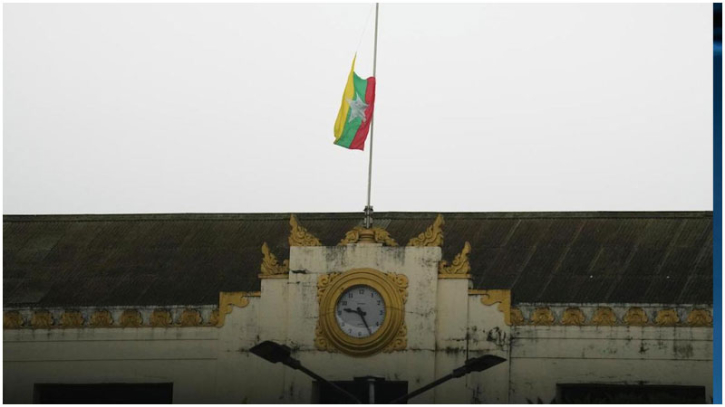Reasons why the US lifted sanctions on Myanmar

It slipped in quietly. No grand announcement, no televised press conference. Just a routine notice from the US Treasury: several Myanmar-linked individuals—business elites connected to the military junta—have been removed from the sanctions list. That's it. No real explanation. For anyone who's been following US policy since Myanmar's 2021 coup, this looked off. Human rights groups were quick to call it "shocking" and "deeply troubling." And fair enough—on the surface, it seems like the US just eased up on a regime responsible for mass violence and democratic backsliding. But here's the thing: this move has very little to do with Myanmar's domestic politics. It's not about democracy or human rights. It's about other geostrategic and geopolitical actors like China. It's about rare earths. It's about geography. And it's about time.
Let's back up a bit. The sanctions weren't lifted in a vacuum. Two weeks earlier, Myanmar's top general, Min Aung Hlaing, sent a letter to US President Donald Trump. In it, he praised Trump's leadership, floated tariff reductions, and, importantly, asked for sanctions relief. The wording was deliberately flattering, almost performative. But also pragmatic. Myanmar wants access to US markets. It needs economic oxygen. And it knows how to talk to a White House that thinks in deals. Shortly after, the US Treasury removed several junta-linked names: businesspeople operating in defence logistics, tech, and supply chains. Some had only been sanctioned recently. Again, no formal reason was offered. But nothing in geopolitics happens in a vacuum.
Myanmar's value to the US isn't rooted in ideology. It's logistics, minerals, and map lines. Look at where it sits, wedged between Bangladesh, India, China, and the Bay of Bengal. It's a perfect fulcrum point in what's become the most contested strategic region today: the Indo-Pacific. From the US perspective, this isn't just about what Myanmar is. It's about what China is doing inside Myanmar. And the picture isn't simple. Beijing has, for years, been investing in infrastructure, buying access, and forging relationships with both the military and insurgent ethnic groups in Myanmar. This includes groups that control key territories filled with rare earth minerals. That part is important. Rare earths are the raw ingredients in nearly every modern technology: batteries, jets, radar systems, smartphones, the whole stack. Right now, China processes more than 90 percent of global supply. Myanmar's mines, most of which are barely regulated, are one of the few alternatives. But China is already embedded there too, refining the ore across the border and flooding global markets.
For the US, that's a nightmare scenario. It means China not only dominates the processing game but is also securing the upstream supply chain. So if Washington wants to reduce dependency, it can't just keep shouting from a distance. It needs to be inside the room. That room, like it or not, includes people with close ties to the military.
Strategically, this starts to make sense. US grand strategy, as discussed by Hal Brands in American Grand Strategy in the Age of Trump, rarely prioritises ideals over positioning. It's often reactive, improvisational, and focused on regaining leverage. Robert Kaplan's The Revenge of Geography helps explain why Myanmar matters regardless of its internal politics, because where it sits matters. Chokepoints like the Bay of Bengal are too important to leave open to adversaries. John Mearsheimer's structural realism, outlined in The Tragedy of Great Power Politics, provides the grim rationale: in a zero-sum world, you engage where your rivals thrive, even if it means dealing with actors you'd otherwise shun. Michael Klare's The Race for What's Left adds the final piece: resources define 21st-century power. Controlling or disrupting rare earth supply chains is no longer just an economic concern; it's a national security concern.
And still, even beyond the resource game, there are other layers. One is maritime control. China has been busy building its "String of Pearls"—a network of ports and naval facilities stretching from mainland China to the Horn of Africa. Myanmar's coast, particularly the Kyaukpyu port, is a jewel in that string. For Washington, preventing this region from becoming a Chinese naval corridor is a high priority, even if it means taking uncomfortable steps. Another layer is regional diplomacy. Bangladesh, India, and Sri Lanka are watching.All of them are trying to balance relations with Beijing and Washington. The US, by engaging Myanmar, even symbolically, may be signalling that it can be pragmatic, offering carrots, not just sticks.
There's also the issue of influence down the road. The Myanmar junta is under pressure, economically, militarily, and diplomatically. Ethnic armed groups are gaining ground. The economy is a mess. If things fall apart, and they very well might, the US will want contacts inside the country who aren't just civil society activists or dissidents in exile. It'll need people who know how things work on the ground, even if those people have, until now, been on the other side of the ledger. Lifting sanctions might be less about rewarding anyone, and more about rebalancing options. In diplomatic terms, this is keeping the door ajar without committing to a full pivot.
Of course, none of this will sit well with rights groups or Myanmar's pro-democracy forces. It sends a confusing message: that the junta's crimes can be overlooked if the timing suits. That may be true, but it's also consistent with how international politics often works. Morality, unfortunately, is a variable, not a constant, especially when strategic minerals, shipping lanes, and regional influence are in play.
So here we are. The US lifted sanctions on some military-linked figures. It didn't do it out of friendship. It did it to stay in the game—to push back, however subtly, against China's tightening grip on Southeast Asia's most strategic fault line. It's messy, uncomfortable, and maybe even risky. But in the long run, it might be the only way to get a seat at a table that's already being set, without Washington.
Source: The Daily Star.
.png)




